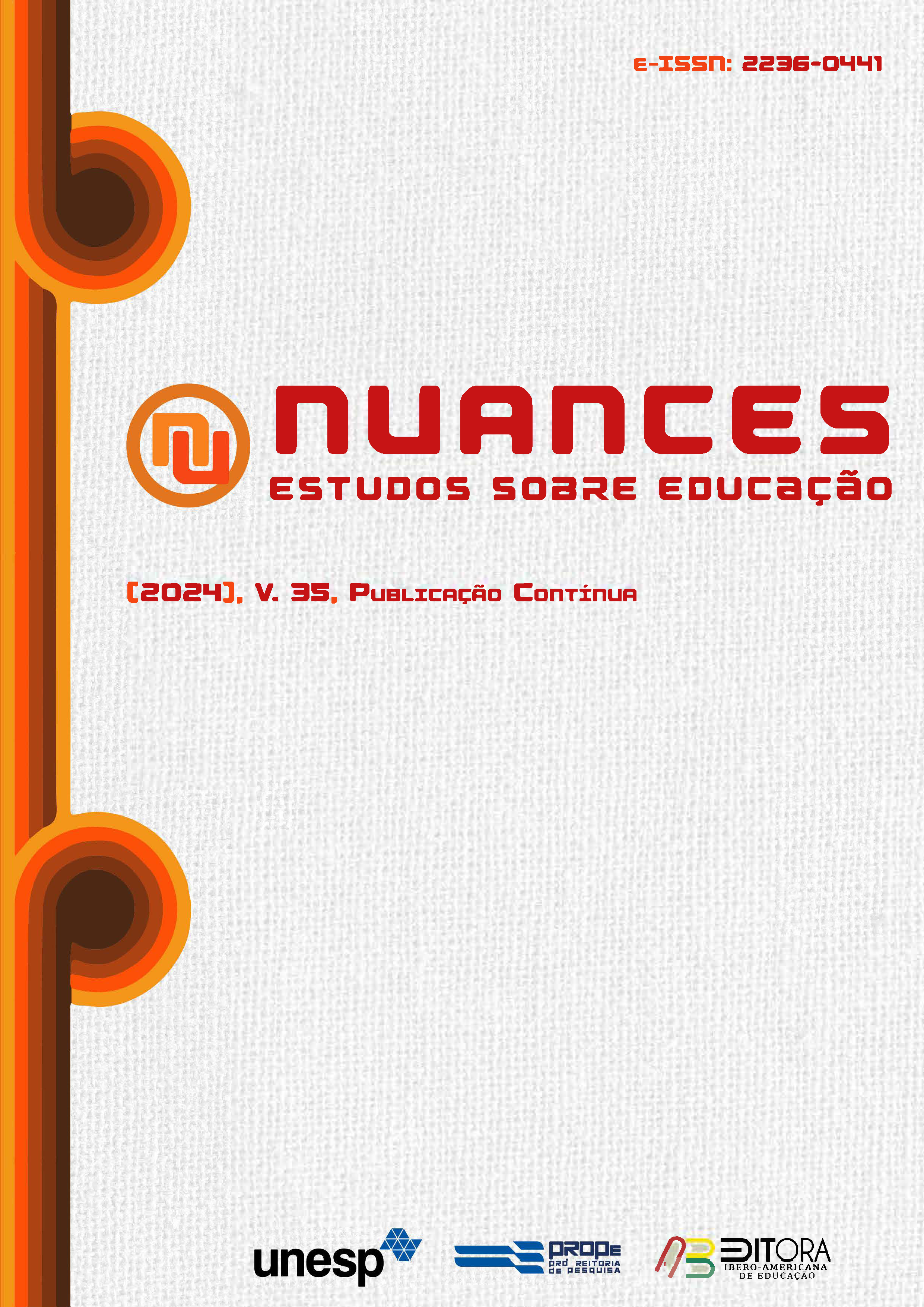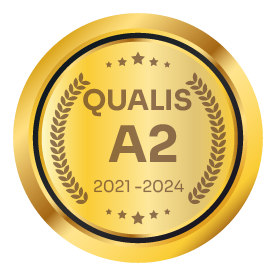Métodos para desenvolver a cultura humanitária dos alunos no processo educacional e de treinamento
DOI:
https://doi.org/10.32930/nuances.v35i00.10773Palavras-chave:
Cultura humanitária, Pensamento crítico, Escolha, Improvisação, Processo educacional e de treinamentoResumo
O presente estudo visa analisar as transformações na cultura humanitária dos alunos por meio do processo educacional e de treinamento, com ênfase na escolha autônoma e no desenvolvimento do pensamento crítico no uso de equipamentos esportivos. A metodologia adotada envolveu uma revisão da literatura científica, a realização de uma pesquisa com estudantes de universidades técnicas no início e ao final do semestre, e a análise de dados para avaliar as modificações nas atitudes dos discentes em relação ao exercício físico. A criação de condições que favoreçam a improvisação de movimentos, no contexto da escolha autônoma e do uso flexível de equipamentos esportivos durante as aulas de aeróbica, contribui para o aumento da atividade física e para o desenvolvimento do pensamento crítico. Por fim, é fundamental integrar a tomada de decisões autônomas e os métodos de pensamento crítico nos currículos de educação física, com o objetivo de promover uma formação integral dos indivíduos.
Downloads
Referências
ALIMOVA, M.; ABDULLAEVA, M.; TUNGATOVA, U.; KARIMOVA, D.; ALIDJANOVA, L.; TURAMBETOV, N. Influence of religious myth on national and political formation across cultures. Cuestiones Políticas, v. 41, n. 77, p. 511–522, 2023. DOI: 10.46398/cuestpol.4177.34
BONDAR, P. I. Gumanitarnaya kultura spetsialista: Kontsept i tekhnologii formirovaniya [Humanitarian culture of a specialist: Concept and formation technologies]. Bulletin of the Belarusian State University of Culture and Arts, v. 2, n. 32, p. 9–21, 2019.
ELIASBERG, N. I.; VERSHLOVSKII, S. G. Gumanitarnaya kultura lichnosti – Osnova i tsel sovremennogo obrazovaniya [Humanitarian culture of personality is the basis and goal of modern education]: Monograph. St. Petersburg. Izd-vo Soyuz, 2008. 114 p.
KHARKOVSKAYA, E.; POSOKHOVA, N.; KUSHCHENKO, E. Influence of creative technologies on the development of educational leisure activities for youth in the contemporary sociocultural environment. Revista Conrado, v. 19, n. 95, p. 536–541, 2023.
KONOVALOVA, L. I.; IZMAYLOVA, E. A. Gumanitarnaya kultura pedagoga, obrazovatelnaya sreda i problema chteniya: Traektorii vzaimodeistviya [The humanitarian culture of a teacher, the educational environment and the problem of reading: Trajectories of interaction]. MAGISTER, n. 2, p. 20–25, 2022.
KONOVALOVA, L. I.; SEMENOVA, L. A. Sovremennaya obrazovatelnaya sreda i gumanitarnaya kultura pedagoga [Modern educational environment and humanitarian culture of the teacher]. Scholarly Notes of Transbaikal State University, v. 1, n. 15, p. 62–67, 2020.
KUDRYAVTSEVA, M. E. Gumanitarnaya kultura lichnosti: Sotsialno-filosofskii aspekt [Culture of personality pertaining to the humanities: Socio-philosophical aspect]. Diskurs, n. 4, p. 3–10, 2016.
KULIKOVA, O. V.; CHUYEV, N. P. Razvitie tvorcheskikh sposobnostei i kultury myshleniya studentov vuza pri izuchenii matematiki [Developing students’ creativity and culture of thought during the study of mathematics]. Vestnik Uralskogo gosudarstvennogo universiteta putei soobshcheniya, v. 3, n. 15, p. 120–128, 2012.
MALINETSKII, G. G. Culture, humanitarian knowledge and self-organization theory. Observatory of Culture, v. 18, n. 4, p. 340–351, 2021. DOI: 10.25281/2072-3156-2021-18-4-340-351
MARKOV, A. P.; VERKHOVYKH, I. A. Otechestvennaya gumanitarnaya kultura kak resurs optimizatsii instituta obrazovaniya v informatsionnom obshchestve [Domestic humanitarian culture as an optimization resource institute of education in the information society]. Kultura i obrazovanie, v. 4, n. 43, p. 5–14, 2021.
POTAPOV, D. A. Personal creativity study: Structure, levels, indicators. Anthropological Didactics and Upbringing, v. 4, n. 4, p. 92–101, 2021.
RADZHABOV, O. R.; LOBACHEVA, Z. N Nekotorye obshchemetodologicheskie aspekty v sisteme gumanitarizatsii vysshego tekhnicheskogo obrazovaniya [Some general methodological aspects in the humanitarization of higher technical education]. Context and Reflection: Philosophy of the World and Human Being, v. 5A, p. 54–63, 2016.
SHICHKIN, I.; SIZOVA, Y.; KOLGANOV, S.; PANOVA, E. Perception of the flipped classroom model by students in the process of studying humanities disciplines. European Journal of Contemporary Education, v. 13, n. 2, p. 423–433, 2024. DOI: 10.13187/ejced.2024.2.423
SMAGULOV, M.; ZHOLMUKHAN, T.; KURMANBAYEV, K.; MUKHITDINOV, R. Some trends in Islamic education forming spiritual and cultural values of the youth under the influence of COVID-19 (the experience of madrasah colleges in the Republic of Kazakhstan). European Journal of Contemporary Education, v. 12, n. 4, p. 1410–1421, 2023. DOI: 10.13187/ejced.2023.4.1410
TIMUSHKIN, A.; MEDVEDEVA, N.; POPOV, A.; KASHITSYNA, L. Assessment of the impact of swimming classes on students’ physical and mental health. Revista Conrado, v. 20, n. 100, p. 408–412, 2024.
UKOLOVA, L. I. Education of the spiritual culture of a growing person through the synthesis of arts in the space of a pedagogically organized musical environment. Art Criticism, n. 3, p. 17–25, 2022.
VERKHOVNYKH, I. A. Disbalans instrumentalnoi i gumanitarnoi podgotovki spetsialista kak fundamentalnaya problema sovremennogo obrazovaniya [Imbalance of instrumental and humanitarian training of a specialist as a fundamental problem of modern education]. Innovative Development of Vocational Education, v. 1, n. 33, p. 12–19, 2022.
VOLKOVA, P. S. Art in the aspect of dialog. On the question of educational philosophy. Art Criticism, n. 1, p. 6–14, 2023.
ZAKHAROVA, O. G. Diagnostika kreativnosti kak psikhologo-pedagogicheskaya problemakst [Diagnostics of creativity as a psychological and pedagogical problem]. In: Innovatsionnye pedagogicheskie tekhnologii: Proceedings of the 8th International scientific conference, Kazan, Russia, May 2018. Kazan: Molodoi uchenyi, 2018. p. 3–6.
ZHUZEYEV, S.; ZHAILAUOVA, Z.; SHICHKIN, I.; AKIMOVA, O.; SHADSKAJA, I.; FILONOVA, A. Influence of academic relations between university teachers and students on educational process efficiency. Revista Conrado, v. 20, n. 96, p. 640–647, 2024
Downloads
Publicado
Edição
Seção
Licença
Copyright (c) 2024 Nuances: Estudos sobre Educação

Este trabalho está licenciado sob uma licença Creative Commons Attribution-NonCommercial 4.0 International License.
Atribuição-NãoComercial
CC BY-NC
Esta licença permite que outros remixem, adaptem e criem a partir do seu trabalho para fins não comerciais, e embora os novos trabalhos tenham de lhe atribuir o devido crédito e não possam ser usados para fins comerciais, os usuários não têm de licenciar esses trabalhos derivados sob os mesmos termos.





